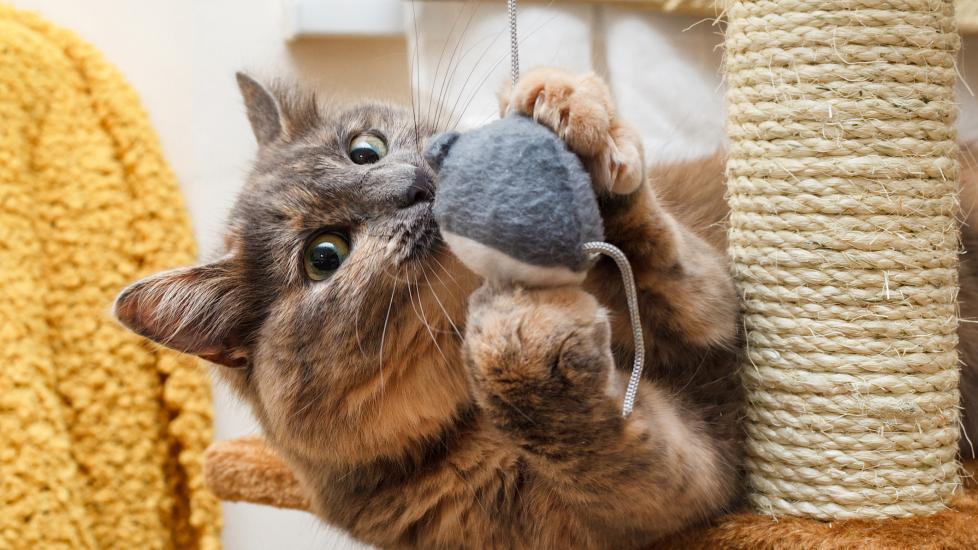Why Do Cats Chew on Things?
Cats are known to chew on just about anything, not just their food. They will also chew on toys or even themselves in response to an itch, boredom, anxiety, or a health condition.
It’s when the chewing is excessive or when they chew on things that are dangerous that it becomes a problem. While chewing on dangerous things might be more common in a curious kitten, cats of any age can have negative effects from chewing on themselves or other things in their environment.
Why Do Cats Chew?
Most of the time, cats chew inappropriate items out of curiosity or when seeking comfort. They might also chew to play or investigate something new or things with a pleasing odor.
Luckily, most kittens outgrow their curiosity, but others continue this behavior after kittenhood. There has also been research into why cats chew things like fabric, and a genetic predisposition similar to obsessive-compulsive disorder has been identified in Burmese and Siamese cats.
When Is Chewing in Cats Healthy?
It’s healthy as long as self-harm is not involved. Normal cat chewing is not only a way to eat their food, but also to explore, give themselves mental stimulation, and prevent boredom or stress.
Mental stimulation can be provided with things like a laser pointer toy or an interactive treat dispenser toy. Keeping a close eye on your cat with their toys and other play items is extremely important. You may have to remove the item as soon as it becomes dangerous.
When Is Chewing in Cats Not Healthy?
Cat chewing is not healthy when it leads to illness or unwanted behaviors. Cats are known to chew on cables and electrical cords, which can lead to very serious consequences including shock or even death by electrocution.
Chewing and ingesting things like shoestrings can cause a very serious blockage of the intestines, requiring surgery to relieve the obstruction.
Cats that are itchy or lacking mental stimulation often chew their fur and skin, leading to skin infections and wounds that need to be treated by your veterinarian.
Medical Issues and Chewing
Many medical issues can arise in cats that cause them to chew excessively. These can be anything from behavioral issues to medical conditions.
If your cat excessively chews on things that they shouldn’t, it’s always best to have them examined by your veterinarian to determine any medical issue before calling it a behavioral problem.
Obsessive-Compulsive Disorders in Cats
Obsessive-compulsive disorder (OCD) in cats can cause excessive and repetitive chewing, often triggered by anxiety and stress. These overindulgent chewing habits can actually cause a release of chemicals from the brain that makes them want to chew more.
Although rare in cats, this OCD behavior can lead to a decreased quality of life for both the cat and their pet parents.
You can help your cat with OCD by not allowing them to overgroom or ingest foreign materials by providing other healthy habits, such as safe toys and treats.
Spending extra time bonding with your cat or giving them a calming supplement can also help decrease unwanted behaviors. Prescription medication can be used to alter their brain chemistry to reduce symptoms of OCD, like excessive chewing.
Pica in Cats
Pica is a medical condition that causes cats to chew, suck, or consume inappropriate or inedible materials. Common items include cardboard, paper, fabric, plants, rubber, soil, and wood.
While pica is not common, it can lead to very serious implications—most commonly intestinal obstructions.
Symptoms of pica in cats include:
Pica is a behavioral issue but it can also be caused by nutritional deficiencies or disease in many different parts of the body, including the brain.
Cats with pica can be managed with special diets to address deficiencies (such as iron deficiency), environmental enrichment, and reduction of stress. Some cats may also be prescribed medications in severe cases.
Dental Issues in Cats
Cats with dental issues or periodontal disease are prone to excessive chewing in an attempt to soothe sore gums.
Dental disease can be very painful. Your cat might have bad breath, tartar buildup, excessive drooling, or changes in weight or appetite, as well as tooth loss or even bloody gums. If you notice any of these signs, take your cat to the veterinarian as soon as possible.
Dental treats, regular teeth brushing, and water additives, as well as routine dental cleanings at your veterinarian’s office while your pet is under anesthesia can help decrease excessive chewing in cats with dental disease.
Houseplant Chewing
Out of curiosity or an interesting smell, cats are known to investigate and often chew on houseplants.
This often happens in cats that live inside with little access to grass and other healthy greens. Chewing on some houseplants can be irritating to their mouth, but can also be more severe, causing significant systemic toxicity and even death.
Houseplants to avoid include:
-
Caladium
-
Dumb cane
-
English ivy
-
Lilies
-
Mistletoe
-
Oleander
-
Philodendron
-
Poinsettia
Adding some cat grass to your home can also help encourage safe chewing behaviors.
When to Call Your Veterinarian
Any form of excessive chewing warrants an exam and some lab work done by your veterinarian.
If your cat is losing hair, has wounds on their skin, is drooling excessively, is not eating, or is lethargic, vomiting, or showing any other abnormal behaviors, it could be the result of their excessive chewing habit.
Your veterinarian will check your cat for underlying medical conditions like skin parasites (fleas, mites, bacteria, and fungus), dental disease, and other medical issues that might contribute to excessive chewing.
If they are healthy, then behavior conditions such as pica or OCD can be treated to help curb unwanted behaviors.
Featured Image: Socreative/iStock / Getty Images Plus via Getty Images
